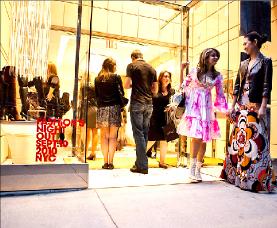World-famous designer Jimmy Choo may have come a long way since working in his family’s humble shoemaking business in Malaysia, but he never forgot his dad’s dedication to perfect footwear.
In fact, the Penang-born Choo, whose haute couture shoes are coveted by royalty and the likes of Madonna and US first lady Michelle Obama, says that shoemaking is in his blood.
“I felt destined to be in the shoemaking business,” he said during a recent interview in Hong Kong, where some of his shoe sketches were auctioned off to raise money for poor students in China.

Photo: Bloomberg
“I was 11 years old when I made my first pair of shoes — they were a pair of flat sandals and I made them for my mother under my father’s guidance ... [He] was never satisfied until a shoe was made perfectly. If it weren’t for him, there would be no Jimmy Choo today.”
After selling his share of an eponymous ready-to-wear line in 2001, the London-based designer now markets a couture line to deep-pocketed clients, particularly the growing number of newly rich Chinese customers riding high on the country’s booming economy.
“We are seeing a lot of wealthy Chinese interested in our designs,” he said. “Business has been affected somewhat by the recession — people are postponing weddings for example, spending less. But a lot of our clients have huge spending powers, so it hasn’t really impacted business too significantly.”
Choo is convinced that tailor-made fashion is the only way to go, despite the success of his ready-to-wear label.
“Clients come to me because we cater to their needs ... Once you go couture, you never go back,” said Choo, clad in a fitted Armani suit. “A person should never have to fit a pair of shoes, the shoe should be able to fit the person.”
True to his artistic roots, Choo has a bolt of inspiration midway through the interview, sketching a pair of women’s heels inspired by a floral centerpiece on the nearby coffee table.
“Shoe-designing is an art form,” he said. “It comes from everyday life, but it must be architecturally sound and aesthetically pleasing.”
After working in restaurants and cleaning shoe factories, Choo earned his way into the Cordwainers Technical College, a venerable London shoemaking school which is now part of the London College of Fashion.
“It was important for me to work whilst studying to help ease my parent’s financial burden,” he said.
He opened up his own London workshop in the late 1980s, gaining recognition and international exposure after being featured in Vogue magazine, but his star soared to new heights after Princess Diana was photographed wearing one of his creations, which now start at an eye-watering £850 (US$1,350).
Choo, these days a British citizen, remained tight-lipped on relations with his former business partner Tamara Mellon, who now controls the label they started, amid reports the pair had a falling-out.
“We once worked together, we parted ways — that’s it,” he said. “I don’t speak ill of old partners. I wish them well ... If you have the skills and talent, there’s nothing to be afraid of.”

Nvidia Corp chief executive officer Jensen Huang (黃仁勳) on Monday introduced the company’s latest supercomputer platform, featuring six new chips made by Taiwan Semiconductor Manufacturing Co (TSMC, 台積電), saying that it is now “in full production.” “If Vera Rubin is going to be in time for this year, it must be in production by now, and so, today I can tell you that Vera Rubin is in full production,” Huang said during his keynote speech at CES in Las Vegas. The rollout of six concurrent chips for Vera Rubin — the company’s next-generation artificial intelligence (AI) computing platform — marks a strategic

REVENUE PERFORMANCE: Cloud and network products, and electronic components saw strong increases, while smart consumer electronics and computing products fell Hon Hai Precision Industry Co (鴻海精密) yesterday posted 26.51 percent quarterly growth in revenue for last quarter to NT$2.6 trillion (US$82.44 billion), the strongest on record for the period and above expectations, but the company forecast a slight revenue dip this quarter due to seasonal factors. On an annual basis, revenue last quarter grew 22.07 percent, the company said. Analysts on average estimated about NT$2.4 trillion increase. Hon Hai, which assembles servers for Nvidia Corp and iPhones for Apple Inc, is expanding its capacity in the US, adding artificial intelligence (AI) server production in Wisconsin and Texas, where it operates established campuses. This

US President Donald Trump on Friday blocked US photonics firm HieFo Corp’s US$3 million acquisition of assets in New Jersey-based aerospace and defense specialist Emcore Corp, citing national security and China-related concerns. In an order released by the White House, Trump said HieFo was “controlled by a citizen of the People’s Republic of China” and that its 2024 acquisition of Emcore’s businesses led the US president to believe that it might “take action that threatens to impair the national security of the United States.” The order did not name the person or detail Trump’s concerns. “The Transaction is hereby prohibited,”

Garment maker Makalot Industrial Co (聚陽) yesterday reported lower-than-expected fourth-quarter revenue of NT$7.93 billion (US$251.44 million), down 9.48 percent from NT$8.76 billion a year earlier. On a quarterly basis, revenue fell 10.83 percent from NT$8.89 billion, company data showed. The figure was also lower than market expectations of NT$8.05 billion, according to data compiled by Yuanta Securities Investment and Consulting Co (元大投顧), which had projected NT$8.22 billion. Makalot’s revenue this quarter would likely increase by a mid-teens percentage as the industry is entering its high season, Yuanta said. Overall, Makalot’s revenue last year totaled NT$34.43 billion, down 3.08 percent from its record NT$35.52